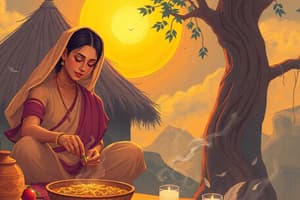Podcast
Questions and Answers
What is the official language of Bangladesh?
What is the official language of Bangladesh?
- Bengali (correct)
- Hindi
- Punjabi
- Urdu
To which family of languages does Bengali belong?
To which family of languages does Bengali belong?
- Dravidian
- Sino-Tibetan
- Indo-Aryan (correct)
- Austronesian
How many official languages does India have?
How many official languages does India have?
- 28
- 18
- 31
- 23 (correct)
Approximately how many people consider Bengali as their mother tongue?
Approximately how many people consider Bengali as their mother tongue?
From which language did Bengali evolve?
From which language did Bengali evolve?
In which direction is the Bengali script written and read?
In which direction is the Bengali script written and read?
What is Bengali literature praised for?
What is Bengali literature praised for?
Who is considered the father of modern Bengali literature?
Who is considered the father of modern Bengali literature?
Where can Bengali speakers be found apart from Bengal?
Where can Bengali speakers be found apart from Bengal?
What did Rabindranath Tagore win the Nobel Prize in Literature for?
What did Rabindranath Tagore win the Nobel Prize in Literature for?
What has the Bengali diaspora contributed to?
What has the Bengali diaspora contributed to?
What is Bengali cuisine known for?
What is Bengali cuisine known for?
Study Notes
Bengali Language
Introduction
Bengali, also known as Bangla, is the official language of Bangladesh and one of the 23 official languages of India. It belongs to the Indo-Aryan family of languages and is historically associated with the Bengal region. Bengali is the mother tongue of approximately 228 million people, making it the fourth most widely spoken language in the world.
History and Origin
The origin of the Bengali language is generally believed to be the 12th to 13th centuries CE, with the earliest surviving Bengali inscriptions dating back to the 14th century CE. The language evolved from Prakrit, a language spoken in ancient India, and was influenced by Sanskrit, Pali, Persian, and Arabic.
Dialects and Varieties
Bengali has numerous dialects and varieties, including Chittagonian, Kishorgonj, and Rajbongshi. These dialects differ in vocabulary, pronunciation, and grammar, with some being mutually unintelligible.
Writing System
The Bengali alphabet consists of 11 vowels and 39 consonants. It uses the Brahmic script, which is a standardized set of scripts used in many Indic languages. The Bengali script is written from left to right and is read top to bottom on each page, with the first line of each page being considered the top.
Bengali Culture and Literature
Bengali culture is rich and diverse, with a long history of literature, art, and music. Some notable Bengali writers include Rabindranath Tagore, who won the Nobel Prize in Literature in 1911, and Bankim Chandra Chattopadhyay, who is considered the father of modern Bengali literature. Bengali literature has been praised for its depth and emotional intensity, as well as its exploration of social issues and themes.
Bengali Cuisine
Bengali cuisine is known for its unique flavors and diverse dishes, such as fish curry, lentil soup, and sweet dishes like rosogolla. The cuisine is influenced by Bengal's geographical location, its rich history, and its diverse population.
Bengali Diaspora
Bengali speakers can be found in various parts of the world, including North America, Europe, and the Middle East. The Bengali diaspora has contributed to the spread and global recognition of Bengali culture, language, and cuisine.
Conclusion
Bengali language is a vital aspect of Bengali culture, literature, and cuisine. It has a rich history and is spoken by millions of people around the world. The Bengali language reflects the unique characteristics of the Bengali people and their history, making it an essential part of global cultural diversity.
Studying That Suits You
Use AI to generate personalized quizzes and flashcards to suit your learning preferences.
Description
Explore the rich history, dialects, writing system, literature, cuisine, and diaspora of the Bengali language and culture. Learn about the origins of the Bengali language, its diverse dialects, the influential Bengali literature, and the unique flavors of Bengali cuisine. Discover how the Bengali language and culture have spread across the world through the Bengali diaspora.




